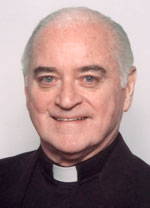In my 54 years as a priest, I have been privileged to give hundreds of retreats. My favorite groups were recovering alcoholics and drug addicts.
I was once the director of a drug and alcoholic rehabilitation facility, Eva’s Village, in Paterson, New Jersey. It was there that I taught the theory behind the 12-step program.
Many of those in recovery had multiple addictions. Nearly all had great difficulty forgiving themselves.
At the opening of each retreat, I would have the group sit in a big circle as I asked each of them the question, “What do you hope to get out of this retreat?”
[hotblock]
Their answers ranged from “I hope to be more comfortable with myself” or I want to learn how to recharge my batteries and get my confidence back.” I also heard, “I need to be more hopeful and less negative” and “I want to find a more positive spirituality … I want to find God’s will for me.”
I announced the theme of one particular weekend, “The Joy of Being Alive,” adding the subtitle, “It isn’t enough to be clean and sober. God is calling you to a higher level of sobriety. He wants you to be happy.”
In other words, the reason you are working so hard to be clean and sober is precisely that you may have a more joy-filled life. To attain this goal, I explained the importance of forgiving yourself. That cannot be overstated. The joy of being alive requires humility, forgiveness and great trust in the power of God.
I always told people at these retreats to concentrate on the third step: “Turn your life and your will over to the God of your understanding.” This implies that you admit you are powerless and that you believe the God of your understanding will begin to do for you what you have not been able to do for yourself. Let go, and let God.
Miracles happen, and millions have been healed by faith. Some alcoholics think that sobriety is the only goal, and heroically, they manage to stay clean. However, there are many in recovery who remain “dry drunks,” as some call them. They may be technically sober, but their joylessness makes the lives of everyone around them miserable.
I reminded the group our goal is even higher than sobriety, and to think about the following quote, “The greatest honor you can give to almighty God is to live joyfully because of the knowledge of his love.” The ultimate goal is to honor God by showing him your gratitude and joy. St. Paul said, “In all circumstances give thanks, for this is the will of God for you in Christ Jesus” (1 Thes 5:16).
I closed the first evening with an exercise to help them experience God’s healing love. It’s one that can help anyone and it goes like this: Sit still, relax, and make yourself comfortable. Close your eyes, and listen to your breathing. Now imagine that you are in the presence of a beautiful tabernacle containing the real presence of God.
Imagine a cloud of light that glows around the tabernacle like a mist. Imagine the cloud expanding and coming closer to you. Soon it permeates and pervades your whole being. In the Lord, you live and breathe. A healing is taking place deeply within. You are being forgiven from all of your sins. Sit quietly. His infinite love is now enfolding you. Be grateful. Enjoy the bliss of God’s healing love.
PREVIOUS: A preferential option for diplomacy
NEXT: Young people inspire by example and word, if we listen




Share this story